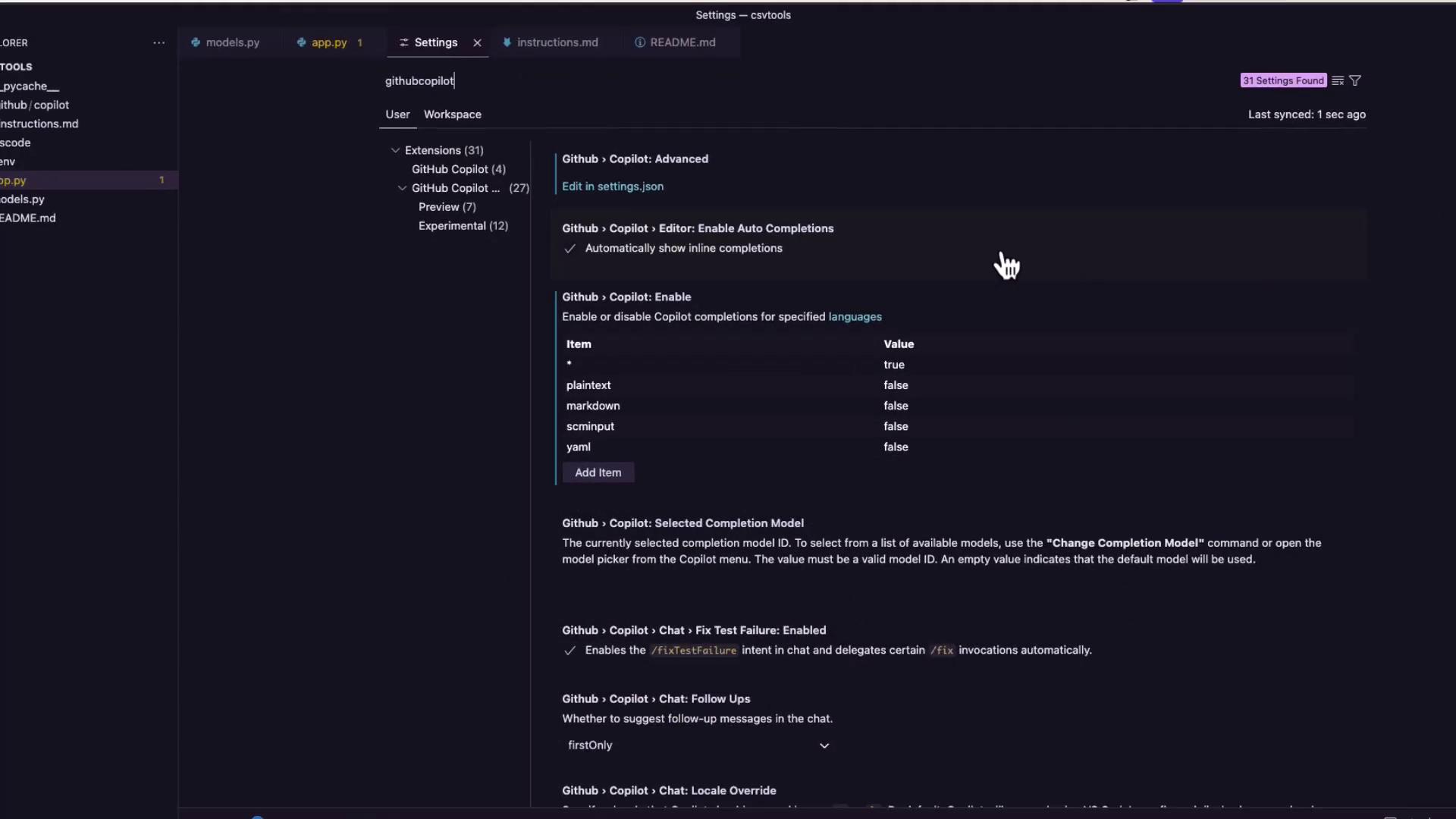GitHub Copilot Certification
GitHub Copilot Basics
Demo Inline Suggestions
In this tutorial, you’ll learn how to leverage GitHub Copilot’s inline suggestions to speed up building a Flask API. We’ll cover:
- Inline completions for new routes
- Inline chat refinements
- Comment-driven code generation
- Next-edit suggestions for refactoring
Prerequisites
- Python ≥ 3.7
- Flask installed (
pip install flask) - GitHub Copilot extension enabled in your editor
- Basic knowledge of RESTful APIs
Note
This demo uses an in-memory database (items_db). For production workloads, integrate a persistent data store like PostgreSQL or MongoDB.
1. Basic Flask App with In-Memory DB
Start with a simple Flask application. Create an app.py file:
from flask import Flask, request, jsonify
from models import Item
app = Flask(__name__)
# In-memory storage
items_db = []
current_id = 1
@app.route('/items', methods=['POST'])
def create_item():
global current_id
data = request.get_json()
if not data or 'name' not in data:
return jsonify({'error': 'Name is required'}), 400
new_item = Item(
id=current_id,
name=data['name'],
description=data.get('description', '')
)
items_db.append(new_item)
current_id += 1
return jsonify(new_item.to_dict()), 201
As you type, Copilot suggests method bodies in real time.
2. Deleting All Items
Type a new route decorator and function signature:
@app.route('/deleteall', methods=['DELETE'])
def delete_all_items():
Copilot may auto-complete:
global items_db
items_db = []
return jsonify({'message': 'All items deleted successfully'})
3. Generating Random Items
Define a “create random items” endpoint:
@app.route('/createrandom', methods=['POST'])
def create_random_items():
global current_id
data = request.get_json()
Copilot often suggests:
if not data or 'count' not in data:
return jsonify({'error': 'Count is required'}), 400
count = data['count']
for _ in range(count):
new_item = Item(
id=current_id,
name=f"Random Item {current_id}",
description=f"This is random item number {current_id}"
)
items_db.append(new_item)
current_id += 1
return jsonify([item.to_dict() for item in items_db[-count:]]), 201
4. Inline Chat: Analyze Numbers
Start with:
@app.route('/analyzenumbers', methods=['POST'])
def analyze_numbers():
data = request.get_json()
Invoke Copilot’s inline chat and ask for number analysis. It may return:
numbers = data.get('numbers')
if not numbers:
return jsonify({'error': 'No numbers provided'}), 400
total = sum(numbers)
average = total / len(numbers)
return jsonify({'total': total, 'average': average})
4.1 Enhanced Validation & Stats
Refine the route for stronger validation:
@app.route('/analyzenumbers', methods=['POST'])
def analyze_numbers():
data = request.get_json()
if not data or 'numbers' not in data:
return jsonify({'error': 'Numbers are required'}), 400
numbers = data['numbers']
if not all(isinstance(n, int) for n in numbers):
return jsonify({'error': 'All elements must be integers'}), 400
result = {
'sum': sum(numbers),
'average': sum(numbers) / len(numbers) if numbers else 0,
'min': min(numbers) if numbers else None,
'max': max(numbers) if numbers else None
}
return jsonify(result), 200
# Alternative registration:
app.add_url_rule(
'/analyzenumbers',
'analyze_numbers',
analyze_numbers,
methods=['POST']
)
5. Comment-Driven Suggestions
Write a descriptive comment, then let Copilot generate code:
# create a route to delete all items
@app.route('/items', methods=['DELETE'])
def delete_all_items():
global items_db
items_db = []
return jsonify({'message': 'All items deleted successfully'})
6. Next-Edit Suggestions for Refactoring
Enable Next-Edit Suggestions in Copilot settings to receive automated refactors. Example: renaming items_db to items_db_new.
Before:
@app.route('/items', methods=['DELETE'])
def delete_all_items():
global items_db
items_db = []
return jsonify({'message': 'All items deleted successfully'})
After accepting suggestion:
@app.route('/items', methods=['DELETE'])
def delete_all_items():
global items_db_new
items_db_new = []
return jsonify({'message': 'All items deleted successfully'})
Enabling Next-Edit Suggestions
Open GitHub Copilot settings and search for next edit suggestions. Toggle it on under the Preview options:

Comparison of Copilot Features
| Suggestion Type | Use Case | Activation |
|---|---|---|
| Inline Completions | Auto-complete functions and blocks | Typing code |
| Inline Chat | Context-aware code suggestions via chat pane | Trigger inline chat (e.g., Ctrl+Shift+I) |
| Comment-Driven | Generate code from descriptive comments | Add comment above function |
| Next-Edit Suggestions | Automated refactoring & renames | Enable in Copilot settings, accept suggested edits |
Links and References
By combining these Copilot features, you can write, refine, and refactor Flask APIs faster and with confidence.
Watch Video
Watch video content